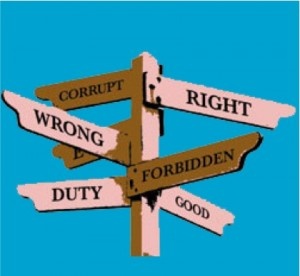
Well that's really big question.
What do we mean by particular moral judgments that we make when we think something like giving to charity is a good thing to do for example. Or an action is right insofar as it maximizes overall happiness, or one ought to always. These are very abstract moral judgments made in everyday life.
We won't be asking whether these are correct. Whether specific moral judgments or abstract moral judgments are correct or incorrect. Rather, we will be asking the status of these judgments.
What are we doing when we make such judgments?. Are we representing objective facts of matter? or are we describing our personal or cultural practices? are we depicting some element of the universe out there?.
the moral facts, are we expressing our emotions toward things?.
These are types of questions that we ask about the status of morality. The idea that we are representing objective facts when we make moral judgments.
Another approach is relativism, the idea that we are describing some kind of culture or personal relative practices when we make these judgments. The third idea is emotivism, that we are expressing our emotions towards the world when we make these judgments.
The question is not whether these particular judgments are right or wrong, but what we are doing when we make these judgments. What are we doing when we judge that something is good or bad? Right or wrong? Virtuous or vicious?. Maybe we have to generate two lists and compare and contrast these lists. A list of empirical judgments, judgments about the empirically discoverable world. and a list of moral judgments, judgments about what's right and wrong, good and bad, etc.
So one way to think about an empirical judgment is to think about something that was discovered. A scientific discovery. Here's a really famous scientific discovery. The earth rotates around the sun. Of course, for many, much of human history, people didn't believe that. They thought that the sun rotates around the earth, or they had some other cosmological theory. But Copernicus, Kepler, Galileo discovered that the earth rotates around the sun and developed our contemporary cosmological theory, how we understand the orbits of the planets. The judgment, the earth rotates around the sun, that's an empirical judgment, or the judgment that electricity has positive and negative charges. Discovered by Benjamin Franklin explains the flow of electricity. That judgment is the judgment about the empirical world, judgments that we can varify by empirical observation.
Okay, now for our second list, moral judgments. To generalize some examples of moral judgments, we can think about positive moral things like giving to charity is good, or taking care of your children is morally obligatory. These are examples of positive moral judgments. We can add to this list something like protesting something you take to be a gross injustice is morally right. That would be a moral judgment. Of course more often actually i think we make negative moral judgments. So we say things like killing out of jealousy was morally bad, was wrong. That would be moral judgment. Or, something like one man having multiple wives depending on non religious reasons like insurance pf women orphans. These are the types of judgments that we could put on our list as moral judgments. So we have come up with two lists. A list of empirical judgments and a list of moral judgments. Some of the items on our list are quite controversial. I think many ordinary people, have felt that there is important difference between the types of judgments that go under heading, empirical judgments, and the types that go under the headings of moral judgments. So one could ask, are these judgments the sort of things that could be true or false?.
So in the case of empirical judgments, it's quite natural to say yes. Whereas, in the case of moral judgments, is that the sort of thing that could be true or false? some people may discuss here religion and legal provisions that have been interpreted differently and others discuss the matter from a scientific point. It may also be mere opinions or mere expressions of our emotions.
So we ask a second question, if these are i mean if moral judgments are like empirical judgments in that they can be true or false, what makes them true or false? in the empirical case you might think of something about the objective human-independent facts. What is it in the moral case then? are they objectively true or false? so you might think the difference between those two is, no they are not objectively true or false, they are only true or false relative to culture or a person or a sensibility or something like that. Also another group of false is about deny. Both of there initial ideas and say, moral judgments are the sorts of things that can be true or false. And what about the idea that the difference is that the moral ones are relativised somehow. And is the motivised idea that the moral judgment are not sort of things that can be true. Are mere opinions or expressions of our emotions right?.



